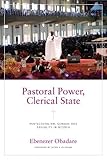Pastoral power, clerical state : Pentecostalism, gender, and sexuality in Nigeria / Ebenezer Obadare ; foreword by Jacob K. Olupona.
Material type: TextSeries: Contending modernitiesPublisher: Notre Dame, Idiana : University of Notre Dame Press, [2022]Description: 1 online resourceContent type:
TextSeries: Contending modernitiesPublisher: Notre Dame, Idiana : University of Notre Dame Press, [2022]Description: 1 online resourceContent type: - 9780268203122
- 0268203121
- 0268203156
- 9780268203153
- 289.9/409669 23/eng/20220923
- BR1644.5.N6 O23 2022
- online - EBSCO
| Item type | Current library | Call number | URL | Status | Notes | Barcode | |
|---|---|---|---|---|---|---|---|
 eBook
eBook
|
Biblioteca "Angelicum" Pont. Univ. S.Tommaso d'Aquino Nuvola online | online - EBSCO (Browse shelf(Opens below)) | Online access | Not for loan (Accesso limitato) | Accesso per gli utenti autorizzati / Access for authorized users | (ebsco)3173234 |
Includes bibliographical references and index.
Online resource; title from digital title page (viewed on September 23, 2022).
Ebenezer Obadare examines the overriding impact of Nigerian Pentecostal pastors on their churches, and how they have shaped the dynamics of state-society relations during the Fourth Republic.Pentecostal pastors enjoy an unprecedented authority in contemporary Nigerian society, exerting significant influence on politics, public policy, popular culture, and the moral imagination. In Pastoral Power, Clerical State, Ebenezer Obadare investigates the social origins of clerical authority in modern-day Nigeria with an eye to parallel developments and patterns within the broader African society.Obadare focuses on the figure of the pastor as a bearer of political power, thaumaturgical expertise, and sexual attractiveness who wields significant influence on his church members. This study makes an important contribution to the literature on global Pentecostalism. Obadare situates the figure of the pastor within the wider context of national politics and culture and as a beneficiary of the dislocations of the postcolonial society in Africa's most populous country. Obadare calls our attention to the creative ways in which Nigeria's Pentecostal pastors utilize religious doctrines, beckon spiritual forces, and manipulate their alliances with national powerbrokers to consolidate their influence and authority.In contrast to rapidly eroding pastoral authority in the West, pastoral authority is increasing in Nigeria. This engaging book will appeal to those who want to understand the far-reaching political and social implications of religious movements--especially Christian charismatic and evangelical movements--in contemporary African societies. It will be of interest to scholars and students of sociology, religion, political science, and African studies.


